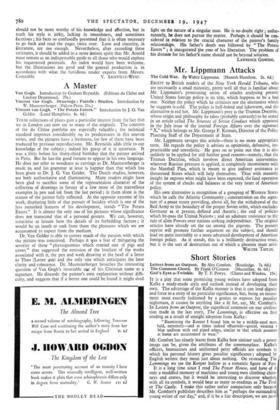Mr. Lippmann Attacks
The Cold War. By Walter Lippmann. (Hamish Hamilton. 2s. 6c1.) EXCEPT to British readers of the New York Herald Tribune, who are necessarily a small minority, pretty well all that is familiar about Mr. Lippmann's penetrating series of articles analysing present United States foreign policy is its title, which happens to be a bad one. Neither the policy which he criticises nor the alternative which he suggests is cold. The policy is half-baked and lukewarm, and the alternative is red hot. Mr. Lippmann's prey is the Truman Doctrine, whose origin and philosophy he takes (probably correctly) to be stated in an article called The Sources of Soviet Conduct which appeared in the July issue of the journal Foreign Affairs over the signature " X," which belongs to Mr. George F. Kennan, Director of the Policy Planning Staff of the Department of State.
Mr. Lippmann savages this article—there is no more appropriate term. He regards the policy it advises as optimistic, defensive, im- practicable and unrealistic. He goes on to point out that it is also unlikely to be applied for still further good reasons—namely, that the Truman Doctrine, which involves direct American intervention wherever Russian pressure is applied, is completely inconsistent with the Marshall Plan, which is meant to give indirect assistance to threatened States which will help themselves. Thus with masterly insight he exposes what might have been expected, the fatal operation of the system of checks and balances at the very heart of American policy.
His awn alternative is recognition of a grouping of Western States which he calls the Atlantic Community ; concentration on the signa- ture of a peace treaty providing, above all, for the withdrawal of the Red Army to the boundary of the proper Soviet orbit, which excludes Germany as, at present., defined and Austria ; the end of 'policies which by-pass the United. Nations ; and an adamant resistance to the rule of alien Powers over nations seeking independence. The original articles have already set the cat among the pigeons. The present reprint will promote further argument on the subject, and should lead on quite inevitably to a more advanced development of American foreign policy. As it stands, this is a brilliantly destructive essay, but it is the sort of destruction out of which a phoenix must arise.
WALTER TAPLIN.


































 Previous page
Previous page